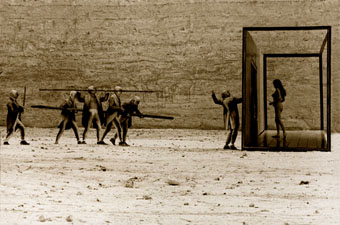The good people at Ubuweb have excelled themselves by turning up this 70-minute avant garde work by a director who’d managed to stay resolutely off my radar despite years spent delving for cinematic weirdness. L’Ange (1982) is a film which stands comparison with the more abstracted moments of David Lynch and the Brothers Quay. In fact some scenes (and the music) are so reminiscent of parts of the Quay canon I’d suspect an influence if I didn’t consider that an unfair diminishing of the Brothers’ own considerable talents. So what is L’Ange? Trying to describe this film isn’t exactly easy so it’s simpler to hijack Ubuweb’s own précis:
During the seventy minutes of The Angel, viewers see a series of distinct sequences arranged upward along a staircase that seems more mythic than literal. Each of the sequences has its own mood and type of action. Early in the film, a fencer thrusts, over and over, at a doll hanging from the ceiling of a bare room. At first, he is seen in the room at the end of a narrow hallway off the staircase, and later from within the room. He fences, sits in a chair, fences – his movements filmed with a technique that lies somewhere between live action and still photographs. At times, Bokanowski’s imagery is reminiscent of Etienne-Jules Marey’s chronophotographs. Further up the stairs, we find ourselves in a room where a maid brings a jug of milk to a man without hands, over and over. Still later, we are in a room where there seems to be a movie projector pointing at us. Then, in a sequence reminiscent of Méliès and early Chaplin, a man frolics in a bathtub, and in a subsequent sequence gets up, dresses in reverse motion, and leaves for work. The film’s most elaborate sequence takes place in a library in which nine identical librarians work busily in choreographed, slightly fast motion. When the librarians leave work, they are seen in extreme long shot, running in what appears to be a two-dimensional space, ultimately toward a naked woman trapped in a box, which they enter with a battering ram. Then, back in the room with the projector, we are presented with an artist and model in a composition that, at first, declares itself two-dimensional until the artist and model move, revealing that this “obviously” flat space is fact three-dimensional. Finally, a visually stunning passage of projected light reflecting off a series of mirrors introduces The Angel‘s final sequence, of beings on a huge staircase filmed from below; the beings seem to be ascending toward some higher realm. Bokanowski’s consistently distinctive visuals are accompanied by a soundtrack composed by Michèle Bokanowski, Patrick Bokanowski’s wife and collaborator. Like Robert Wiene’s The Cabinet of Dr. Caligari (1919), Bokanowski’s The Angel creates a world that is visually quite distinct from what we consider “reality,” while providing a wide range of implicit references to it and to the history of representing those levels of reality that lie beneath and beyond the conventional surfaces of things.

Asking what it all means is pointless, we’re in the world of dreams here and once again we see how film is able to capture the ambience of dream states in a way no other artform can manage. For an obviously low-budget production there’s real craft and control at work throughout L’Ange, not least in the excellent score—a blend of strings and electronics—which could easily stand alone. Many experimental films of this type quickly outstay their welcome via prolonged repetition or a failure to exploit the imaginative potential of their techniques. Like Lynch and the Quays, Bokanowski successfully balances on the dividing line between narrative and abstraction, finding images unlike any we’ve seen elsewhere. Yes, I enjoyed this a lot, and now I want to watch it again on DVD (if such a thing exists). Anyone who enjoys The Grandmother or Rehearsals for Extinct Anatomies is advised to set aside seventy minutes of their time.
Previously on { feuilleton }
• The Hourglass Sanatorium by Wojciech Has
• Babobilicons by Daina Krumins
• Impressions de la Haute Mongolie revisited
• Short films by Walerian Borowczyk
• The Brothers Quay on DVD

